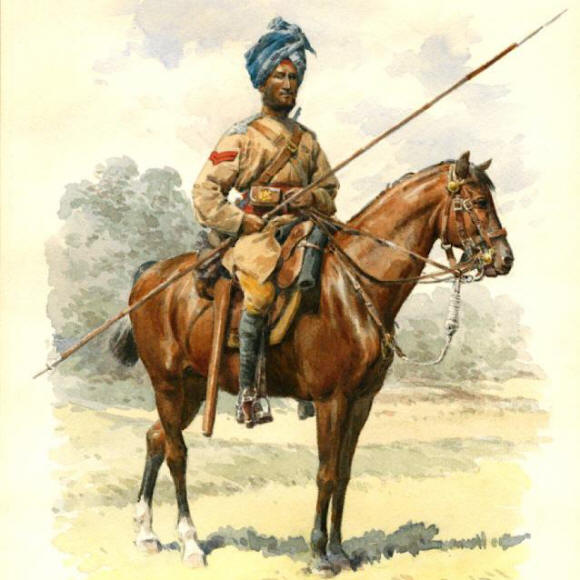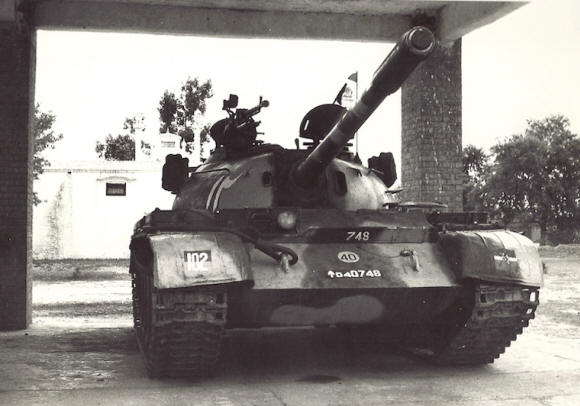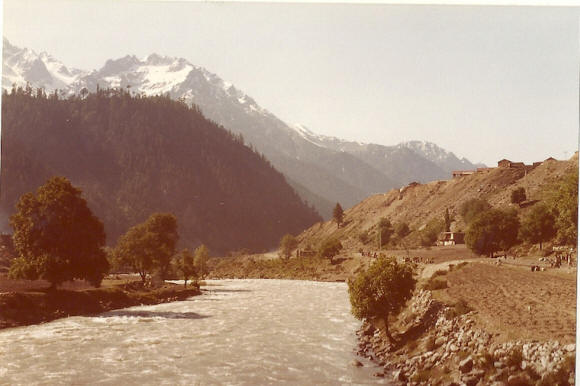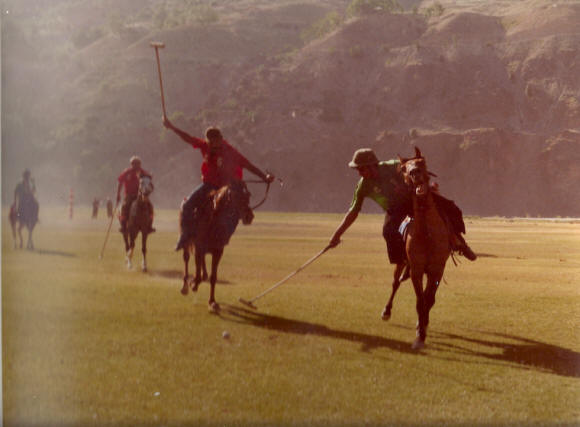|

ONE OF
THE MAJOR events I took part in whilst 2ic of C Squadron
in Tidworth involved taking a number of soldiers
adventure training to Pakistan. I was never quite sure
whether it was meant to be a jolly for me, or because I
had got the whole squadron lost in the middle of the
night on Salisbury Plain a few weeks before. There was
no GPS in them days, mind, and map reading with minimal
light on that moonscape was no picnic. I had ended up
having to walk ahead of my tank with a compass to get us
back, but the one consolation was that nobody else knew
where we were either.
Anyhoo, our CO at the time had decided that all
squadrons under his command should carry out adventure
training, and that C Squadron should visit our long lost
cousins the 13th Lancers in Pakistan. My Squadron
Leader, Andrew Hill, told me to crack on and that was
about as much direction as I got. And so Exercise Tartan
Trek was born from humble beginnings.
Now, back in 1983 there was no internet nor mobile
phones and communications by telephone to the Indian
subcontinent were tenuous at best, so we corresponded
with our Pakistan army colleagues by signal, a sort of
modernised telegraph system. It seemed to work fine
initially and we were told we were welcome to visit.
Our knowledge of Pakistan was limited, but we knew the
13th Lancers were based in Lahore, and I think we used a
school atlas to find out exactly where that was.
However, to justify the “adventure” bit of adventure
training we had to find something mildly challenging and
strenuous to do. Someone, and I have no idea who,
suggested we go trekking up the Swat Valley in the
north-east of the country, so we found it on the map and
agreed that would be the plan. I think we expected it to
be a bit like Glencoe but maybe a bit warmer – but we
didn’t really have a clue. This was to soon become
abundantly clear.
Having got the go-ahead to proceed, the first problem
was getting there. Clearly we would have to fly, but in
those pre-internet days you couldn’t just book online.
However, there were these things called bucket shops
where airlines dumped their surplus tickets at a
discounted price. My 2ic, for the trip, Niall
Macnaughton, took upon himself the task of purchasing
the cheapest tickets he could find, and eventually
returned from London with the tickets in hand. We were
to fly from London to Karachi and then on to Lahore.
Eventually approximately fifteen C Squadron personnel
left Tidworth for Heathrow and then on to Karachi. I
remember nothing of the journey at all except that when
we disembarked to change ‘planes the heat hit us like a
wall. I was also mildly surprised that there was no-one
to meet us, but thought we would be received by our
hosts at Lahore. However, when we got to our destination
there was nobody to meet us there either, and I began to
suspect that something was amiss. We had arrived in
Pakistan and nobody seemed to know, or to care. Classic
young officer challenge.
So Niall and I left the boys at the airport, hailed a
cab, and went to search out our hosts. It being the
middle of the day and very warm, Lahore was deserted and
we soon enough got to the relevant barracks. All was
still as we walked into the RHQ of the 13th Lancers was
their Adjutant, sitting in civvies at his desk and
catching up on his paperwork. As we knocked at his door
and entered he looked up and said something like; “Oh
no, I do hope you are not our visitors from the UK!” We
told him that indeed we were, and it transpired he knew
we were coming but just not when. Our last couple of
signals had gone adrift.

Chinese-built T-59 Pakistani tank of 36th Lancers in
Lahore
Anyway, a
few swift phone calls and all was sorted. We went back
for the boys with transport and found them already being
looked after by our hosts. After this unplanned
beginning things went smoothly, and we were looked after
very well and with great kindness. Aside from some local
sightseeing and a tour of some other military units in
the Lahore cantonment, Niall and I did a couple of
journeys by internal PIA flights for more official
visits. For example, we went up to Peshawar to visit
General Lhodi, who commanded their 4 Corps and who gave
us a detailed briefing on the operational situation in
his command. Remember, at this time the Soviets were
just across the border in Afghanistan.

General Lhodi, the author and Niall Macnaughton
Eventually we made our way up to the Swat Valley, via
the Khyber Pass, where we intended to do a bit of
trekking. The Pakistan Armoured Corps had a hut – more
of a bungalow – at Kalam, where we stayed three nights.
Our hosts couldn’t understand why we wanted to walk up
the Valley as they were perfectly happy to drive us
instead. What we probably didn’t fully understand that
we were literally in bandit country, which explained why
they insisted we had a full platoon of fully armed
infantry accompanying us all the time we were up there!

Swat Valley
Well,
everyone knows about the Swat Valley these days (above).
It’s where all the bad guys are – Mujahadeen, Taliban,
Al-Quaeda, you name them, that’s where they all hang
out. It’s a bit like the fabled Badlands of Wild West
fame but infinitely more dangerous. Jesse James and his
gang would have taken one look and thought “nah, bit
dodgy mate”. Ignorance is bliss, as they say, and we
were ignorant of the dangers, but we thought it would be
safe as houses and thought no more about it.
We also visited the Chitral Scouts regiment at their HQ
at Drosh Fort at the top of the Valley close to the
border with Afghanistan. They entertained us most
generously in that remote location, and we played them,
and lost heavily, at football, partly because we were at
considerable altitude and the boys were quickly gasping
for breath. Their soldiers were fully acclimatised and
as fit as fiddles and I think they graciously took their
foot off the gas when they saw us floundering and kept
the score line fairly respectable. They also put on a
polo match for us (below), as spectators not
participants thank goodness, which was pretty
spectacular given the setting.

Polo in Chitrel
In
retrospect our trip to Swat wasn’t at all physically
demanding as I think we’d hoped it might be, mainly
because our hosts insisted on driving us most of the
way, but in terms of being “adventurous” it most
certainly was. Historically, though, we weren’t the
first westerners to go there, not by a long chalk.
Alexander the Great and his armies had swung past
centuries before, and it was remarkable to meet
blue-eyed, blond-haired Kalash people, quite unlike
neighbouring tribes in appearance, who are often claimed
to be the descendants of that incursion so long ago (and
mentioned by Rudyard Kipling in his The Man who would be
King).
I can’t remember too much of our journey back to the UK,
except when exiting Pakistan we were temporarily halted
by a particularly evil looking customs official who
suspected we were carrying drugs (we travelled in
civvies). The minute I said we were there as guests of
the Pakistan Army he scuttled away with profuse
apologies and we proceeded without further ado. The rest
of the homeward journey was unremarkable.
Back in Tidworth we got back into the swing of things
and were surprised to find that, despite having been
away for only three weeks or so, we were quite unfit and
had trouble keeping up with the regular Regimental runs.
But we eventually got over that. One of the boys, LCpl
Alex McKnight I think it was, had also picked a
particularly nasty bacterial disease called Shigella,
which made him quite ill for some time after our return
until the tropical medicine boys at the RAF Wroughton
hospital worked out exactly what was wrong with him,
whereupon he recovered.
Did the trip qualify as adventure training? Undoubtedly
so, for we had not only visited our long lost sister
regiment the 13th Lancers and represented the British
Army, but had also been exposed to sights, sounds,
smells and challenges which most of us had not
experienced before, and I dare say many of us will not
have experienced again. One of the other RTRs repeated
the visit a few years later and it was a much more
official and well organised operation than our
pioneering effort in 1983. They were met by official
hosts on arrival with much saluting and uniforms in
evidence, and no bad thing. But I still have a fondness
for the way we did it, warts and all.
To come in Part 14; Exercise Lionheart, I promise!
© Stuart Crawford 2020
Illustration of the 13th (Duke of Connaught's Own)
Bengal Lancers in 1900 by Hobday |

